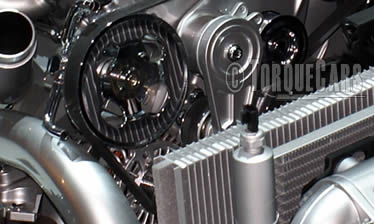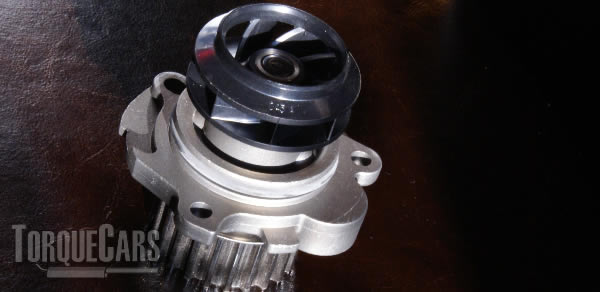1.8T Problems and Common Faults and Issues
"Find out about the problems with the VAG 1.8T Engine"
My 1.8T ran happily without any problems for over 70,000 enthusiastically driven miles.
Please bear in mind that this article relates to problems on the early 20V 1.8T engine and not the more recent TFSi engines.
Thankfully 1.8T Problems are few and far between, but many of the common faults and issues that crop up escalate into major and expensive problems if not addressed early on.
They are good engines, but if you know the weakspots and problem areas you can mitigate or avoid problems in the first place.
They are also extremely tuneable and I've seen 1.8T tuning projects handling 350hp in stock form!!

Common 1.8T Problems and Issues
- 1.8T Coilpack problems
- Use of Blow Off Valves
- Important notes about oil on the 1.8T engine
- engine oil use of the incorrect grade of oil
- Air Filter Oil Warning
- Timing Belt & Tensioner Problems
- N75 Valve problems
- Water Pump problems
- Rough Idle and poor running
Let's delve in detail into each of these problem areas and help you to avoid them or diagnose faults and issues.
The ECU on the 1.8T is very protective and if it detects too much boost, insufficient fuel or 02 sensor issues it will go into a low power "limp home" state.
It is very easy to trigger this if you start throwing mods at it without addressing the potential problems it will cause.
See my video guide on diagnosing and avoiding common 1.8T engine problems and faults.
1.8T Coilpack Problems
Some users have experienced difficulties with early coil packs, however the overwhelming majority of them have likely been changed by now, and later coil packs do not seem to be causing any issues.
The faulty coilpack will cause misfiring and rough running, this will be especially evident on idle and feel like a loss of power.
Sometimes a coilpack will completely fail, but typically you'll experience and intermittent fault and should investigate at this point.
Important notes about oil on the 1.8T engine
Weak points - the engine oil used in your 1.8T must be completely synthetic and changed at the appropriate service intervals (see your owner's handbook for specifics, although normally a long life VAG Group service is performed at roughly 24,000* miles and a basic service is performed at around 9000 miles).
According on how the automobile is operated (for example, if you are a heavy footed driver or make frequent short trips on a cold engine, the service interval will really be shortened from these values).
The use of the incorrect grade of oil will result in the oil pump being seized as a result of sludge accumulating in the turbo housing. A catastrophic loss of oil pressure and engine failure occur as a result of this, and unless you can demonstrate that the proper oil grade was used, the warranty is voided.
Most other synthetic oils are only suggested for 9000 miles, however Audi extended life oil is touted to last up to 24,000 miles!

Changing the oil and filter on a regular basis seems to be more prudent, given the fact that metal particles may cause harm to the engine when they get suspended in the oil.
We recommend changing the oil once a year or every 12,000 miles using Audi extended life oil, which will help to extend the life of your engine.
The engine requires 3.7 to 4.35 litres (depending on the oil filter and sump used; transversely mounted engines require more oil than longitudinally mounted engines) of fully synthetic 5w-30 oil (Audi long life oil must comply with VW 504 00 or 507 00 specifications; transversely mounted engines require less oil than longitudinally mounted engines) (Castrol SLX long life III is the special Audi approved oil).
Using the incorrect oil will almost always result in a harmful sludge buildup, which will ultimately cause the turbo to malfunction. NB: Not all oils labeled as synthetic are in reality synthetic oils.
Air Sensor issues: Air Filter Oil Warning
You should avoid using an oil-impregnated filter since the air flow sensor will get clogged.
If you observe any hesitation or difficulties that might be attributed to a malfunctioning MAF, remove the sensor and clean it with an IPA-based solvent, then you should replace it.
If the air flow is too great it can cause the air flow sensor to burn out, so if you've upgraded the turbo and are getting flat spots this could be the cause of that issue.
Sensors do wear out over time, so they will need replacing, but sadly the air sensor is often the last place people go when they start having running problems and issues on their 1.8T.
Timing Belt & Tensioner Problems
Replace the timing belt every 60,000 miles a failure can be catestrophic. VAG recommend this is left for longer than this but anecdotal evidence suggests it would be prudent to change this more frequently to be on the safe side.

A broken timing belt on your 1.8T engine will cause the cams to run out of sync, pushing the valves into the pistons and causing a substantial misfire.
Please ignore the recommended service intervals and change this item sooner. Even if you don't do many miles, the belts will degrade over time.
Use of Blow Off Valves
Because of the loss of system pressure caused by the installation of a blow off valve or dump valve, difficulties with engine control may arise.
There are now VAG-friendly partially recirculating dump valves available that also recycle the lost pressure, keeping the ECU happy and the engine running.
The ECU can be adjusted or you can use an aftermarket ECU if you have a particular need to run an atmospheric dump valve.
Whilst on this subject let's discuss some common problems with the stock N75 that you might experience.
N75 Valve problems
If your N75 is malfunctioning, you'll most likely notice decreased boost, power surging, or lumpy power delivery as a result. It may even go into limp-home mode at some point.
Because the N75 is controlled by the ECU and works as a bleed valve, it is responsible for controlling the spool up and boost duration of the turbocharger.
It's common to notice decreased boost and/or power surges or lumpy power delivery when your N75 is malfunctioning. It may even go into limp-home mode.
Some failures are really caused by a leak in the vacuum lines, therefore be sure to check the N75 valve itself.
So, what exactly does the N75 handle?
However, if you pull off the gas pedal the boost created will just keep piling up; if the turbo shuts off, you will have to wait for it to spool back up again. In most engines, the wastegate aids the turbocharger in maintaining its spinning and providing power but this can lead to pressure building up in the intake and damage the turbo as it works against much higher air pressure!
The N75 makes advantage of unused boost to keep the turbo spinning under mild load circumstances, which is rather ingenious. This is why you don't want to install an atmospheric dump valve, since it wastes all of that wonderful pressurised fast moving air (besides, it causes the ECU to malfunction, and you don't want a malfunctioning ECU, do you?)
It is located between the wastegate and the high pressure outlet of the turbocharger, and it has two outputs and only one boost input. Either the intake or the wastegate receives boost from the output (either completely directing all boost to wastegate when closed or leaking some boost to the intake in order for the engine to start more quickly).
The top of the N75 is secured by a tiny screw; in certain vehicles, this screw has a locking thread to prevent tampering with the assembly. However, if you're fortunate, you won't get thread locked and will be able to make changes to it.
Only few tweaks are required to create a noticeable improvement, and you must remember that the ECU is expecting a certain range of performance from you and will react aggressively if you fail to meet those expectations.
A little bit of an art, but getting the N75 valve to operate properly is important. If you get it just right, very little air will be vented from the wastegate, which results in smoother power delivery but less overall boost.
You'll gain more boost on the way to the wastegate if you turn it to the left; nevertheless, you'll notice a spike in power when the N75 shuts and re-opens.
Overall, a performance version provides a broader range of control, a quicker reaction, and is less prone to sticking or leaking, all of which might create issues with your power delivery.
While it has been reported that users have successfully swapped the N75 for a N18, we recommend that you look for a high-performance version.
Water Pump problems (Overheating)
Why VAG used a plastic impeller is beyond me, these are prone to break off.
Thankfully plastic does very little damage other than the potential to cause blockages but a lack of flow will cause the engine to overheat.
Replacement of the water pump makes sense every time you get the cambelt and tensioner changed as it involves similar amounts of work.
Metal impellers are available and these will last much much longer and are more reliable than the plastic ones, so if you can source one I would strongly recommend you upgrade.
When mine went I could only get a plastic one at short notice as I couldn't afford to have my car off the road, so I purchased the one shown below.

Rough running and poor Idle
There are a few issues that can cause the 1.8T to run poorly or have idling issues. Here are the 6 most common causes of rough running and poor idling on the 1.8T.
- The most likely culprit is the MAF which will degrade as it ages, and often fails when you run higher boost levels.
- Coils and plugs are the next most likely problems, check which cylinder is misfiring and swap the coil packs over and see if the problem moves with the coilpack, if it does you have a winner (or a loser) and replacing that will solve the problem
- Soiled plugs will also cause poor running and this should be easy to spot with oil or soot build up on the plugs themselves, or signs of tracking across the electrode. Replacing the plugs will fix this.
- Next areas are vac leaks, split pipes and loose joins are typical problem areas, the air is outside of what the ECU expects and it tries to adjust accordingly, but when it becomes a large problem it will fail and you'll get rough running.
- The O2 sensor is also an area that can cause these issues, and poor fuel, carbon build up and just general wear and tear can cause the sensor to fail.
- I've also known the coolant temperature sensor to cause poor running when it starts to fail. This is commonly on pre 2002 1.8T engines (black cover) the replacement ones have (green covers) and are more reliable.
Please have a look at our guide on VAG group turbochargers as well as our tuning articles, which will assist you in getting the most out of your automobile projects. Our forums are a fantastic way to talk with other members about your projects and to share tips and ideas with other users.
Visit my new TorqueCars YouTube channel and be sure to subscribe if you haven't already done so.
If you are interested in the best mods and upgrades for your 1.8T read our 1.8T tuning article to see which upgrades and mods work best on your engine.
There are a few problems and issues to look out for on other popular vag group engines, but I've split these off into other articles.
- 2.0 TFSi carbon buildup issues - direct injection engines require an intake clean.
- 2.0 TFSi problems - N75 and N249, high oil consumption, Cam Follower wear, Water Pump failure, and Turbo issues
- 2.0 TDi problems - Flywheel, Oil pump, Lumpy Idling
- 1.8T Problems - Diagnosing the common faults and issues
To discuss any points raised in this article please join our forum, and if we've missed out any points please drop us a message in the box below so we can add it to the article for our readers.
Please Check out my YouTube channel, we're regularly adding new content...
PLEASE HELP: I NEED YOUR DONATIONS TO COVER THE COSTS OF RUNNING THIS SITE AND KEEP IT RUNNING. I do not charge you to access this website and it saves most TorqueCars readers $100's each year - but we are NON PROFIT and not even covering our costs. To keep us running PLEASE Donate here
If you liked this page please share it with your friends, drop a link to it in your favourite forum or use the bookmarking options to save it to your social media profile.
Feedback - What do You Think?
Please use our forums if you wish to ask a tuning question, and please note we do not sell parts or services, we are just an online magazine.
Help us improve, leave a suggestion or tip
Please watch this video and subscribe to my YouTube channel.
2 Responses to “1.8T Problems and Issues”

 Click to accept YouTube Cookies & Play.
Click to accept YouTube Cookies & Play.
Great article! However, the comments on the timing belt issues and recommended service at 60k miles doesn’t make sense. Everywhere I look it says that the 1.8T engines have timing chains, not belts. They do not need to be replaced. They are supposed to last the lifetime of the vehicle.
AFAIK there is a chain for the Intercam timing this chain never needs changing, the belt on the other hand should be changed. Bear in mind this article relates to the 20V turbo, not the more recent TFSi engines.